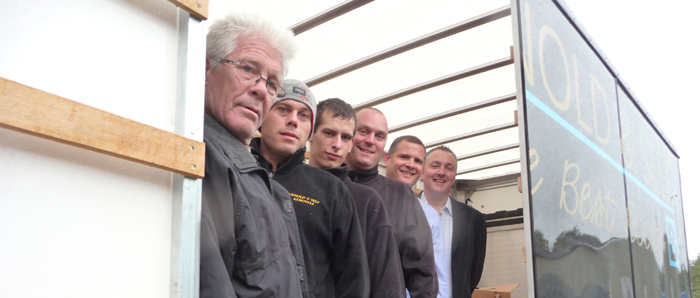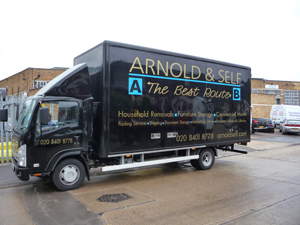An interview with Ian Siddle on starting from scratch in a recession. By Steve Jordan
Fighting through a recession is tough for any company. If you lose your biggest client at the same time, it’s probably curtains. That’s what happened to Arnold & Self in Mitcham. This is how the new company fought back.

Arnold & Self was started in 1986 by Peter Arnold and Andy Self. When the recession of the 1990s hit, Peter stepped back leaving Andy to run the business. The work was a combination of removals work and multi-drop transport with the company’s biggest customer being the Alders furniture store for which Arnold & Self were handling up to 30 drops a day. When Alders went bust it was more than the small removals business could stand.
Ian Siddle had been working as the company manager for some time and had become a shareholder in the company. When the company stopped trading, and Andy left, it fell to Ian to restructure the company and start from scratch, right in the middle of the worst recession in post-war history.
“The first job was to look at the overheads and cut back as much as we could,” said Ian. The vehicle fleet included two 18-tonne vans and three 7.5 tonners. “We had to lose both the 18-tonne vehicles.”
Staffing levels too came under the spotlight but as Andy had already left and the company’s surveyor had chosen to go too, there was little need for more cut backs. “We had to lose one of our operational staff and, when another member of the office staff left, we didn’t replace her.”
The staff who remained turned out to be the saviour of the company. Everyone co-operated and worked out ways of keeping the company going with everyone working as a team. “I had a good core of five guys. We had to have a few frank conversations but we agreed a way forward to keep us all in business. Perhaps they all saw it as a new opportunity. Without their support it would have been very difficult for me to continue.”
 Cutting cost was only half the problem, Ian and his team also had to increase sales. “We made a decision to keep away from muiti-drop deliveries,” Ian explained. “We concentrated on removals and on improving the quality of our service so we could do better jobs.” Within six months Ian had been able to buy back one of the 18-tonners he’d sold earlier.
Cutting cost was only half the problem, Ian and his team also had to increase sales. “We made a decision to keep away from muiti-drop deliveries,” Ian explained. “We concentrated on removals and on improving the quality of our service so we could do better jobs.” Within six months Ian had been able to buy back one of the 18-tonners he’d sold earlier.
Ian said that when he was cutting his overheads it focussed his mind on exactly what everything costs and gave him a much more realistic view of his pricing policy. “We need to get a fair return from the customers. There are still plenty of people who will pay for quality but you have to convince them you can supply it. If you only get 20 minutes with a customer you have to create a good impression. If you turn up in an old van in your work clothes, and have a negative attitude you will only get the work on price. We upped our image, used better materials including quilted covers, and used our membership of BAR and The Guild as sales aids.”
The local removals community was a great help to Ian too. He and some friends had started the SARS meetings a few years earlier where members of the local moving community get together informally every few months for dinner and a chat. “In particular Stuart Almandras from Britannia Sandersteads and Steve Frieze were very supportive,” said Ian. “Mixing with them and others at the meetings allowed me to swap ideas with them and gave me the confidence to know I was doing things the right way. It’s very important for moving companies to talk to each other.”
Arnold & Self was a member of BAR before the restructuring. Ian said that, although he felt that BAR had not always represented the smaller mover as well as it could, the position was improving. “There are a lot of good people doing a lot of good work to help BAR engage with its members now,” he said. “But in some ways they are still missing a trick. For example, they had the annual conference then sent a feedback form to all those who attended. It’s us people who didn’t go they should be talking to.” The company has now regained its BAR membership.
Last year Ian went into partnership with Derek Deamer to build the company’s commercial moving work. As with any new venture it’s slow going at the start. “But we are now beginning to get some good contracts,” said Derek.
The last two years have been very tough indeed for Ian and his team, but they are beginning to see some stability now for the first time in a long time. “I think it will be tough for a year or two yet,” said Ian. “The summer was slow to start and I don’t believe we’ve seen the full effects of the government’s austerity measures. We just have to promote harder and fight for every job and make sure we make a profit on everything we do. We are determined not to get caught in that spiral of reducing prices. We need to convince customers to pay for a better service.”
There will be many movers around the country who will agree. How quickly the industry brings itself back to prosperity will be determined largely by how successfully they can achieve their aims.
Above photo: (left to right) Don Hollick, Sacha Colvin, Ian Siddle, Derek Deamer, Martin Ferrier, Dave Atkinson, and an Arnold & Self vehicle.